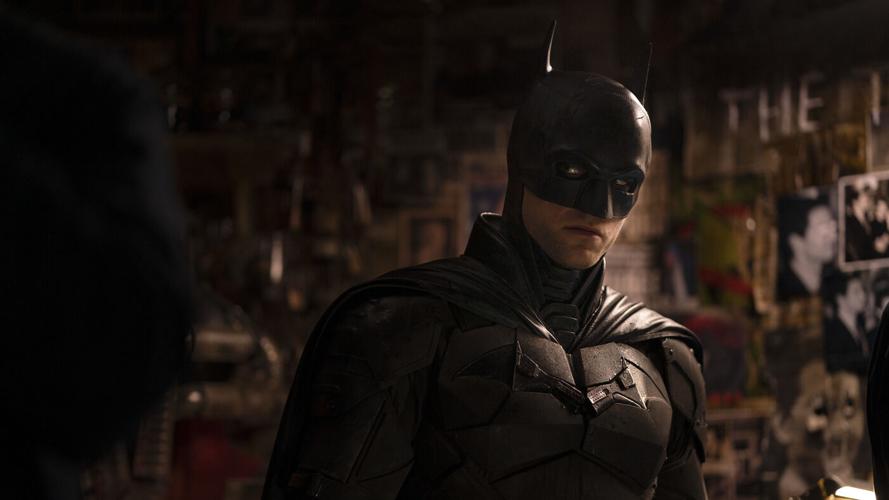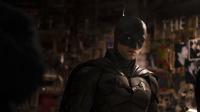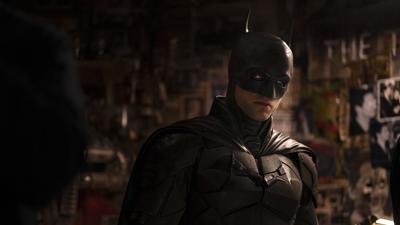Editor’s note: The views and opinions expressed in this review are solely those of Marlon Wallace and do not necessarily reflect the views and opinions of WBOC.
For fans of the Batman comics, this initially felt like it might be an adaptation of Batman: The Long Halloween, which came out in 1996. Last year, an animated feature was produced of that comic. Yet, this film, directed and co-written by Matt Reeves, was merely inspired by that 90’s comic. It starts off with a murder that occurs on Halloween and follows its investigation over the course of a week. The comic had the murder mystery spread out over a calendar year involving rival mobsters. Reeves’ film occurs in the run-up to a mayoral election, as this film injects a bit of politics into the narrative, not unlike Todd Phillips’ Joker (2019). As with that Phillips’ film, I felt the politics or the political commentary here was a bit muddled, vague or not addressed in a way that it perhaps should have been.
Reeves’ filmmaking is very much akin to David Fincher’s Seven (1995) or Zodiac (2007). Yes, both those films deal with police tracking a serial killer who is taunting the police and leaving clues like puzzles or riddles, which Reeves’ film also does. Reeves’ tone is akin to Fincher as well, which is dark and suspenseful to gritty and harsh degrees. However, this film also takes a queue from the Saw franchise and in particular Spiral (2021) in that its antagonist delights in torturing his victims and putting them in deadly physical contraptions. I wouldn’t describe this film as torture porn unlike the Saw films. It’s not delighting in the kills, as Reeves artistically distances the audience from those kills.

THE BATMAN, from left: Jeffrey Wright as James Gordon, Robert Pattinson as Batman, 2022. ph: Jonathan Olley / © Warner Bros. / Courtesy Everett Collection
In terms of the murder mystery, if one has seen the Fincher films or any of the entries in the James Wan and Leigh Whannell franchise, then the mystery won’t seem that mysterious. In some ways, it will feel formulaic to what Fincher or other directors of thrillers might do. The body count isn’t that high. One of the murders is more done off screen and without much fanfare. With the exception of one of the victims, I’m not sure that this film does enough to make us care about the murders. High-profile public figures are being killed, but Reeves makes us feel mostly detached emotionally from them to the point that we don’t truly care.
Reeves tries to make us care about one of the victims, a mayoral candidate, by giving him a young son. Reeves will occasionally show this son, but not enough is done with the mayoral candidate’s son to really invest us. Reeves doesn’t build enough of a connection with the little boy to let us really feel the impact of the son losing his father. The only victim for which Reeves successfully gets us to care is the district attorney, played by Peter Sarsgaard. The reason Reeves is successful is because we spend time with the district attorney. Sarsgaard’s performance is so good as to convey this man’s fears, so that the audience empathizes with him, even if his murder might seem justified.

To that point, the Batman comics have introduced us to a famous Rogue’s Gallery. Often, those bad guys are simply bad and aren’t justified in their actions. The main bad guy here is nicknamed the Riddler, played by Paul Dano (There Will Be Blood and Little Miss Sunshine). The Riddler is exposed to be a psychopath, but, like recent comic book film villains, such as Kilmonger and Thanos, the Riddler does seemingly make an argument that is understandable. The Riddler identifies a real and serious problem that should be addressed but isn’t. His methods aren’t understandable but his arguments are. Kilmonger, who was the villain in Black Panther (2018), made understandable arguments and that 2018 blockbuster had its titular hero take those arguments and address them in the end. This film doesn’t do that. The titular hero here doesn’t take the Riddler’s arguments and address them.
That argument goes to one about poverty and socioeconomic inequality. The Riddler brings up how poverty and socioeconomic inequality leads to problems, such as crime and other issues like mental health. However, at no point does the titular hero do anything to address poverty or inequality. It’s ironic because the titular hero is a wealthy man, a billionaire. In the comics, it’s pointed out that Batman aka Bruce Wayne does a lot of philanthropy or charity. However, real change, which this film suggests, requires political change – fundamental and progressive political change. This film revolves around a political campaign, but the film doesn’t distinguish as to the policies required to implement that change. That is why I said in the beginning how the political commentary felt muddled, vague or not addressing things as it should have.

As a comic book film with cool action, the film is solid. Batman is a super-hero with no super powers. He uses his inherited wealth to fund gadgets or devices that can help him fight crime. With the exception of one sequence, one that occurs in the police station, there wasn’t that much that impressed in terms of Batman and his gadgets. In terms of Batman as a character, played by Robert Pattinson (Tenet and Twilight), Pattinson’s performance was fairly well done in its grimness and one-note cynicism until the unearned reversal at the end.
Rated PG-13 for strong violent and disturbing content, drug content and language.
Running Time: 2 hrs. and 55 mins.
In theaters.





























